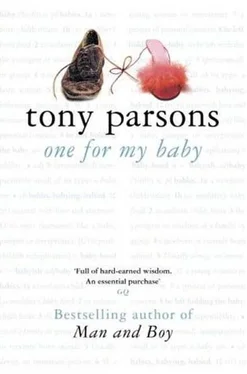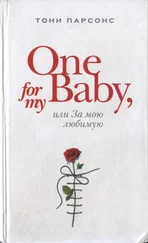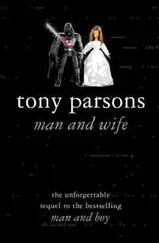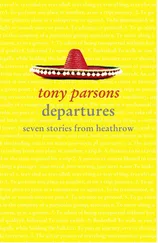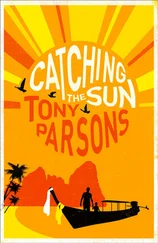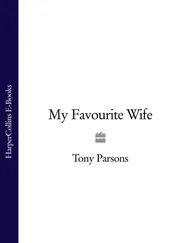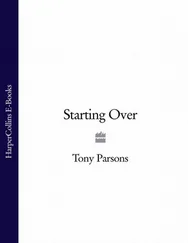H E LOOKS LIKE THE KIND OF GARDENER who should have his own TV show.
He is tanned and fit, casually funky, his sun-bleached hair pulled back in a ponytail and tied with a yellow elastic band. Inside his New Zealand rugby shirt, his body is lean and hardened by all that pruning, or whatever it is he does.
The funky gardener is wearing well. What is he? Fifty? At the very least, despite those space-age sneakers and a pair of combat shorts with an impressive number of pockets. But he is well preserved and has that kind of genial openness that you find in Aussies and Kiwis, or at least the ones who come over here and enjoy showing off about how easy-going they are compared to all us sour-puss Brits.
My mother and Joyce watch him snip quickly and expertly at the rose bushes.
“Spring’s almost here,” says the gardener. “Time to get rid of all your unproductive old stems and clear the way for your lovely new shoots.” He turns and flashes them a wide, white smile, snipping all the while. “Bish, bash, bosh.”
I expect them to set about him with their gardening tools for daring to touch my mum’s roses without permission. But they both seem charmed by the handsome gardener.
“What your age?” Joyce asks him.
“Ha ha!” he says. “Ha ha ha!”
“Good money as gardener?” she demands. “You marry?”
Under that tan he is blushing, which makes me think that beyond the slick charm offensive he must be a decent guy. Bastards don’t blush, do they? My old man isn’t the biggest blusher in the world.
“I notice you’re pruning just above the bud,” my mother says, restoring some order.
“This young lady’s got sharp eyes,” he says, and now it’s my mum who is laughing and going red. The gardener gets serious. “You always prune just above to control the shape of the bush, Mrs. Budd.”
“Not Mrs. Budd,” Joyce informs him. “She not married anymore. Divorce come through. Decree absolute. All finish.”
“Joyce!”
“She single.”
“Well, she’s too good-looking to be single for very long,” the gardener says.
My mother throws her head back and laughs, having the time of her life.
“Yes,” she says, “and too clever to ever get married again.”
“Never say never, Mrs. Budd.”
“Sandy,” says my mother.
“Sandy,” says the gardener, savoring it in his mouth. “Sandy.”
It shouldn’t have worked out like this, but it is my mother who looks as though she has been released from some kind of open prison, with time off for good behavior. And it is my father, the one who made the break for freedom, who looks like the partner who got left, dumped, elbowed.
Now how did that happen?
While my mother has lost weight, done something to her hair and slowly put the pieces of her life back together, finding herself in her garden and in her friendship with Joyce Chang, my father seems to have unraveled before my eyes.
My mother helps Joyce in her garden, watches what she eats, works in her own garden. My father drinks too much, eats rubbish, doesn’t work enough. There’s a sad bloated look about him. For the first time that I can remember, he looks much older than his years.
Living alone in his tiny rented flat, he seems lost between two lives, the old one with my mother as a family man and the new one with Lena as a born-again mister lover-lover. With both my mother and Lena out of his life, he is neither a family man nor mister lover-lover. He is in a twilight zone of takeout pizzas and rented rooms, living the life of a student although he is almost sixty.
I see him every day at my nan’s flat. I watch him talking to my mum about what they should do. The situation seems to change daily. Phrases that meant nothing to us a while ago-words like “housebound” and “bedridden”-are now charged with meaning, coming home to us in all their awful reality.
Can she live here? Should she be moved? What does the doctor think? When will the doctor see her again?
My parents are polite to each other. My father treats my mother with an almost painful formality, as though he is well aware that the manner of his leaving inflicted a terrible wound that will take years to heal. She is far more natural with him, allowing herself to feel frustration or exasperation when they can’t decide if it is too soon to start calling hospices or homes, and then blowing her top-in her own sweet-natured, moderate way-because she feels guilty for even thinking about putting my nan into care.
My old man never lets his guard down that far. It’s only with me that he allows himself to be irritable.
When my mother has gone I put The Point of No Return on the stereo, knowing my nan likes to fall asleep to a bit of music. It’s one of the great underrated Sinatra albums, the last thing Frank recorded for Capitol in September 1961. A lot of Sinatra fans think that The Point of No Return was a bit of a throwaway, just a fulfilment of contractual obligations, but there’s some timeless stuff on there. “I’ll Be Seeing You,” “As Time Goes By,” “There Will Never Be Another You.”
All those songs that, when Sinatra sings, somehow make you feel a little less lonely.
“Does it always have to be Frank bloody Sinatra?” my father says. “Christ. I had eighteen years of this stuff when I was growing up.”
“She likes it,” I say.
“I know she likes it. I’m just saying that maybe we could put on something else once in a while. Some soul music or something.”
“She’s eighty-seven,” I tell him, ashamed that we are bickering about music while the woman who is my grandmother and his mother is in the next room being eaten up by cancer. “She hasn’t got any Bee Gees records. Sorry.”
“The Bee Gees are not soul music,” says my old man.
“What are they then?”
“A bunch of buck-toothed disco assholes.”
“I can tell you’re a writer. You’ve got a real way with words, haven’t you?”
“I’m off duty.”
“You’re always off duty.”
When Plum arrives he drives me home in the SLK and I find myself wishing that I could hate him more than I really do. His life is unhappy, and while I believe that he deserves to be punished for walking out on my mother, I wonder if the sad, undergraduate life he is living is not too much.
Does he really deserve all this? The nights alone in rented rooms, the takeout pizzas, the collapsing body, the abiding contempt in my heart?
Just for wanting one more go at getting it right?
“Did they know Rose?” Jackie asks me as we are leaving my flat.
I turn to look at her. She is wearing some Western designer’s idea of a cheongsam. It’s midnight blue with red piping, very tight fitting, cut short with a small slit up the side, but she doesn’t look anywhere near as tarty as she usually does. In fact, she looks great.
“Did who know Rose?”
“These people we’re seeing tonight. The people at the party. Did they know your wife?”
“Josh knew her. He worked with her in Hong Kong. He’s another lawyer. Nobody else. Why do you ask?”
“I just want to know if I’m going to be compared to her. To Rose. I want to know if they are all going to be looking at me and saying-oh, she’s no Rose, is she? She’s not like our Rose.”
“Nobody’s going to compare you to Rose, okay?”
“Honest?”
“Honest. She was never their Rose. They never knew her. Only Josh. And he’s not-he doesn’t-oh God. Jackie, shall we just go?”
“How do I look?”
She smoothes the sides of her dress with her hands, and something about the small, insecure gesture tugs at my heart.
“You look-incredible.”
“Really?”
“Really. Incredible is exactly the word. Believe me. I know words. I’m an English teacher. Incredible, adjective. Hard to believe, amazing. You really do.”
Читать дальше
